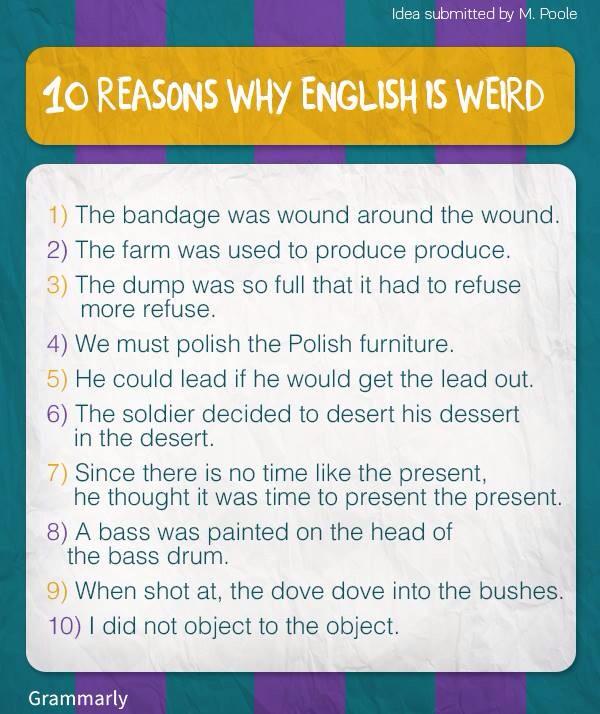Friday, 27 November 2015
Tuesday, 10 November 2015
Wednesday, 4 November 2015
10 Reasons Why English is Weird
1) We can tell that the first 'wound' is the verb as it 'was' - meaning it is an action and we can tell that the last 'wound' is the noun as it says 'the' infront of it, meaning its the object/thing.
2) We can tell that the 'farm' is the subject, we can tell the first 'produce' is the verb as straight after comes the other 'produce' meaning that thats the noun, as usually, next to eachother it goes in that order (the noun comes after the verb).
3)We can tell that the 'dump' is the subject, we can tell that the first 'refuse' is the verb as an action comes before the object/thing, meaning that the last 'refuse' is the noun.
4) We can tell that the first 'polish' is the verb and we can then tell that the second 'Polish' is the adjective as it describes the furniture. It also has a capital letter, meaning that it is referring to the country Poland.
5) We can tell that the first 'lead' is the verb as it says 'could' infront of it. Also, we can then tell that the second 'lead' is the noun as it says 'he would get (the lead) out', it would have to be an object if he's getting it 'out'.
6) We can tell that the first 'desert' is the verb as he 'decided to' - meaning that it's an action. We can then tell that the second 'dessert' is the noun, as he applys the action to that. Then we know that the last one must be the subject, as he deserted it 'in' the desert.
7) We can firstly tell that the first 'present' is the time reference as it says 'in the'. We can then tell that the second 'present' is the verb as it is an action followed by the third 'present' which is the noun (object).
8) We can tell that the first 'bass' is the verb as it 'was painted' and we can then tell that the second 'bass' is the adjective as it is describing the drum.
9) We can tell that the first 'dove' is the noun as it is closely followed by the exact same word meaning that the second 'dove' is the verb.
10) We can tell the first 'object' is the verb as it is describing what its doing to the second 'object' which is the noun (object).
2) We can tell that the 'farm' is the subject, we can tell the first 'produce' is the verb as straight after comes the other 'produce' meaning that thats the noun, as usually, next to eachother it goes in that order (the noun comes after the verb).
3)We can tell that the 'dump' is the subject, we can tell that the first 'refuse' is the verb as an action comes before the object/thing, meaning that the last 'refuse' is the noun.
4) We can tell that the first 'polish' is the verb and we can then tell that the second 'Polish' is the adjective as it describes the furniture. It also has a capital letter, meaning that it is referring to the country Poland.
5) We can tell that the first 'lead' is the verb as it says 'could' infront of it. Also, we can then tell that the second 'lead' is the noun as it says 'he would get (the lead) out', it would have to be an object if he's getting it 'out'.
6) We can tell that the first 'desert' is the verb as he 'decided to' - meaning that it's an action. We can then tell that the second 'dessert' is the noun, as he applys the action to that. Then we know that the last one must be the subject, as he deserted it 'in' the desert.
7) We can firstly tell that the first 'present' is the time reference as it says 'in the'. We can then tell that the second 'present' is the verb as it is an action followed by the third 'present' which is the noun (object).
8) We can tell that the first 'bass' is the verb as it 'was painted' and we can then tell that the second 'bass' is the adjective as it is describing the drum.
9) We can tell that the first 'dove' is the noun as it is closely followed by the exact same word meaning that the second 'dove' is the verb.
10) We can tell the first 'object' is the verb as it is describing what its doing to the second 'object' which is the noun (object).
Subscribe to:
Posts (Atom)
